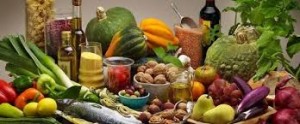The diet of fasting is parallel to the vegetarian and Mediterranean diets which are well known for their contribution in reducing cardiovascular disease, cancer, cholesterol, etc
During fasting it is not permitted to consume foods of animal origin (meat, dairy, eggs). The consumption of fish and olive oil is limited depending on the period of fasting. But consumption of seafood (squid, cuttlefish, octopus, crabs, mussels and shrimp) and snails allowed in all periods of fasting
The main concern with long-term fasting is a significant reduction in consumption of protein, iron, calcium and vitamin B12. All these nutrients play an important role in our health and need special attention during fasting. Deficiencies in these nutrients can be avoided if the person’s daily Mediterranean diet is well balanced even with the lack of animal food.
Protein
Protein is important for energy, renewal of cells, maintaining muscle mass and more. The main sources are meat, dairy, eggs, fish and legumes. Protein of animal origin gives us all the essential amino acids, which are necessary for the proper functioning of the body. Dietary proteins rarely contain all the essential amino acids and so should be a combination of plant foods. For example, lentils and rice together, complete all the essential amino acids which would not have if we were consuming each food separately.
Sources of protein allowed during fasting:
Pulses, beans and soy derivatives such as tofu, snails, shellfish, fish (in some periods of fasting), nuts, seeds, whole grain foods (in smaller quantities compared to other sources).
Iron
The iron is an important element in creating red blood cells and also good for the circulation of oxygen in the body. The animal origin of iron is better absorbed by the body from the iron found in plant foods.
Sources of iron during the fasting:
Fish (when allowed), seafood, legumes (eg lentils, black-eye beans), nuts, wholegrain cereals, fortified foods such as breakfast cereals, dried fruits and dark green, leafy vegetables (eg broccoli, spinach, arugula …). It is important to note here that the combination of products rich in vitamin C (citrus fruits, tomatoes, peppers, kiwi, etc.) to sources of iron increases the absorption of iron. For example, lots of lemon in boiled spinach or a salad with tomatoes and lemon along with the lentils.
Calcium
Recent scientific studies have shown that one of the nutrients with the lowest consumption during fasting was Calcium. Calcium plays an important role in obtaining and maintaining good bone mass, but not only. Also significant is the role of the neurological system and proper control of blood pressure.
The main sources of calcium are dairy products, which are not allowed during fasting. Calcium from milk is better absorbed by the body than the calcium found in plant foods. Calcium, however, in a few vegetables such as broccoli has a very good absorption rate.
Sources of calcium during fasting:
Snails, small fish (eg, smelt) where permitted, legumes, dark green vegetables, sesame and derivatives (tahini, halva), salted dried figs, dried fruits such as almonds, soy or rice milk fortified with calcium, calcium-enriched tofu, cereals fortified with calcium.
Vitamin B12
This vitamin plays an important role in the formation of blood cells and our genetic material, namely DNA, and the smooth functioning of the nervous system and brain. The only source in the usual dietary plan is from animal products. The enrichment of foods with vitamin B12 is another possible source.
Sources of B12 during the fasting:
Fortified breakfast cereals, rice or soy milk.
The diet during the fasting period can lead to beneficial effects on our health as long as the above nutrients are taken in adequate quantities. The beneficial effects of fasting due to the reduced consumption of cholesterol, trans fats and saturated fatty acids resulting in a significant reduction in total cholesterol, bad cholesterol and triglycerides, helps to reduce cardiovascular diseases.
We also have an increase in fiber and folic acid due to increased consumption of fruits and vegetables. Dietary fiber plays an important role in reducing cholesterol and good functionality in thin and thick intestine. It also contributes to the prevention of various cancers. Folic acid is essential for the creation of red blood cells, and the proper functioning of the genetic material, DNA. However, an increase in carbohydrate consumption is observed and this needs attention in certain cases. Carbohydrates in fasting come mainly from cereals, fruits, legumes and starchy vegetables. Particular attention is needed by people with type 2 diabetes, where increasing carbohydrates may adversely affect the sugar pre-and postprandial. People with type 1 diabetes need to adjust their insulin by increasing carbohydrate















{ 0 comments… add one now }